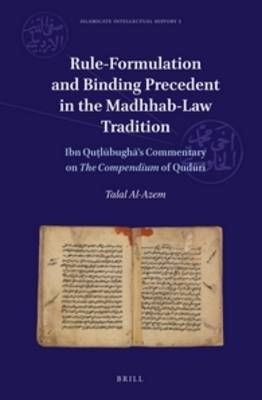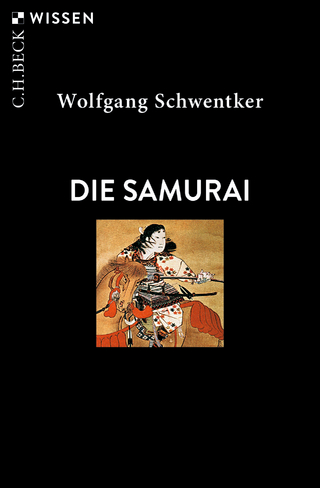
Rule-Formulation and Binding Precedent in the Madhhab-Law Tradition
Brill (Verlag)
978-90-04-32283-7 (ISBN)
In Rule-Formulation and Binding Precedent in the Madhhab-Law Tradition, Talal Al-Azem argues for the existence of a madhhab-law tradition’ of jurisprudence underpinning the four post-classical Sunni schools of law. This tradition celebrated polyvalence by preserving the multiplicity of conflicting opinions within each school, while simultaneously providing a process of rule formulation (tarjīḥ) by which one opinion is chosen as the binding precedent (taqlīd). The predominant forum of both activities, he shows, was the legal commentary.
Through a careful reading of Ibn Quṭlūbughā's (d. 879/1474) al-Taṣḥīḥ wa-al-tarjīḥ, Al-Azem presents a new periodisation of the Ḥanafī madhhab, analyses the theory of rule formulation, and demonstrates how this madhhab-law tradition facilitated both continuity and legal change while serving as the basis of a pluralistic Mamluk judicial system.
Talal Al-Azem, DPhil (2011), University of Oxford, is the Mohammed Noah Fellow at the Oxford Centre for Islamic Studies. His research focuses on traditions of law and learning in the medieval and early modern Muslim world.
CO N T E N T S
Introduction 1
Chapter 1 Authors 23
A The compendium author: Qudūrī . . . . . . . . . . . . . . 24
B The commentator: Ibn Quṭlūbughā . . . . . . . . . . . . . 37
Chapter 2 History 51
A Ibn Quṭlūbughā’s sources . . . . . . . . . . . . . . . . . . 51
B Periodisation . . . . . . . . . . . . . . . . . . . . . . . . . 53
Period 1: Foundational ‘Ḥanafī’ opinions (ca. 150–200) . . . 57
Period 2: Formative transmission (ca. 200–300) . . . . . . 58
Period 3: Classical consolidation (ca. 300–400) . . . . . . 60
Period 4: Tarjīḥ (ca. 400–650) . . . . . . . . . . . . . . . . 63
Period 5: Taṣḥīḥ (ca. 650–870) . . . . . . . . . . . . . . . . 79
Who are the ‘latter-day jurists’ (al-muta’akhkhirūn)? . . . . 87
C Historical geographical patterns . . . . . . . . . . . . . . . 90
D Periodisation and the typologies of jurists (ṭabaqāt al-fuqahā’) 96
Chapter 3 Theory 105
A Ibn Quṭlūbughā’s introduction to al-Taṣḥīḥ wa-al-tarjīḥ . . 108
B Analysis of the topics . . . . . . . . . . . . . . . . . . . . . 118
1 Definitions . . . . . . . . . . . . . . . . . . . . . . . . 118
2 The procedures of rule-determinacy . . . . . . . . . . 125
3 Judicial discretion . . . . . . . . . . . . . . . . . . . . 134
C Arguments for binding precedent . . . . . . . . . . . . . . 137
1 The ethico-religious argument . . . . . . . . . . . . . 138
2 The argument from legal-system consistency . . . . . 139
3 The argument from legal-system coherence . . . . . . 143
4 The argument from strengthened decision-making . . 145
5 The argument from predictability . . . . . . . . . . . 145
viii CO N T E N T S
6 The argument from historical determinism . . . . . . 146
D Historical developments . . . . . . . . . . . . . . . . . . . 149
1 Target audiences: muftis and muftis . . . . . . . . . . 149
2 Rule-determination (tarjīḥ) vs. rule-review (taṣḥīḥ) . . 150
3 From monist to pluralistic legal systems . . . . . . . . 153
4 Madhhab-law: tradition, system, concurrent jurisdictions 154
E The (lack of) definition of ẓāhir al-riwāya . . . . . . . . . . 157
Chapter 4 Practice 163
A Ibn Quṭlūbughā’s practice of rule-review . . . . . . . . . . 163
B The functional relationships of commentary . . . . . . . . 166
To resolve a juristic dispute . . . . . . . . . . . . . . . . . 169
To clarify a point of ambiguity . . . . . . . . . . . . . . . . 174
To identify the opinion or the transmission used in the rule formulation
. . . . . . . . . . . . . . . . . . . . . . . . . 177
To further expand upon the passage . . . . . . . . . . . . 179
To identify an editorial problem in the passage itself . . . . 187
C Employed legal rhetorical reasoning . . . . . . . . . . . . . 189
1 Arguments of juristic evidence (dalīl) . . . . . . . . . 190
2 Arguments of transmission (riwāya) . . . . . . . . . . 192
3 Arguments of language and logic . . . . . . . . . . . . 195
4 Arguments from revelation and the early Muslim community
. . . . . . . . . . . . . . . . . . . . . . . . . . . . 197
5 Arguments from scholarship . . . . . . . . . . . . . . 200
6 Justifications from juristic considerations . . . . . . . 202
7 Justifications from context . . . . . . . . . . . . . . . 207
8 Justifications from exigencies of change and necessity . 209
9 Justifications of lifting difficulty and facilitating ease . 212
10 Justifications of preceding juristic authority . . . . . . 214
D Operative principles of rule-determination . . . . . . . . . 218
E The degree of congruence between theory and practice . . 229
Conclusion 235
Appendices 243
A The Writings of Qudūrī 245
B Jurists cited by Ibn Quṭlūbughā 249
C Works cited by Ibn Quṭlubughā 255
CO N T E N T S ix
Works Cited 259
Index 271
| Erscheinungsdatum | 25.08.2016 |
|---|---|
| Reihe/Serie | Islamicate Intellectual History ; 2 |
| Verlagsort | Leiden |
| Sprache | englisch |
| Maße | 155 x 235 mm |
| Gewicht | 551 g |
| Themenwelt | Geisteswissenschaften ► Geschichte ► Regional- / Ländergeschichte |
| Geschichte ► Teilgebiete der Geschichte ► Militärgeschichte | |
| Geisteswissenschaften ► Religion / Theologie ► Islam | |
| Recht / Steuern ► Allgemeines / Lexika | |
| Recht / Steuern ► EU / Internationales Recht | |
| Recht / Steuern ► Rechtsgeschichte | |
| ISBN-10 | 90-04-32283-3 / 9004322833 |
| ISBN-13 | 978-90-04-32283-7 / 9789004322837 |
| Zustand | Neuware |
| Haben Sie eine Frage zum Produkt? |
aus dem Bereich


